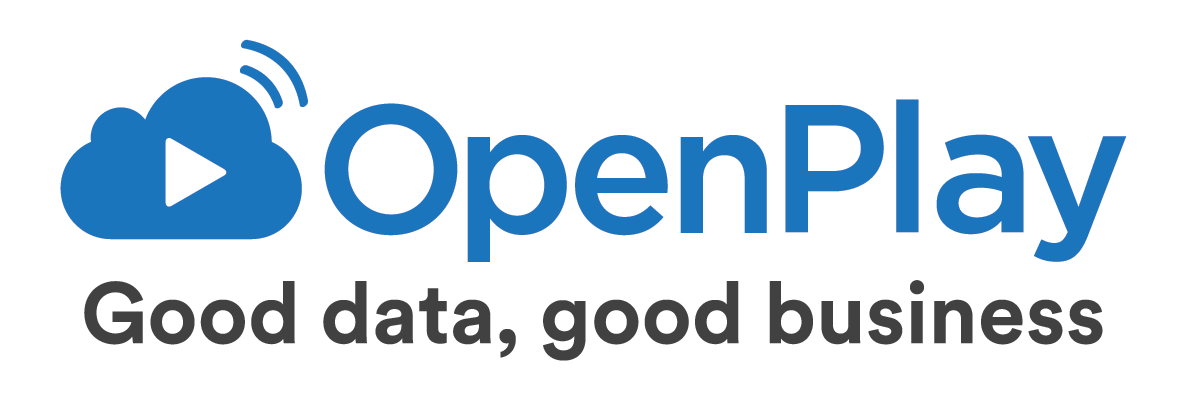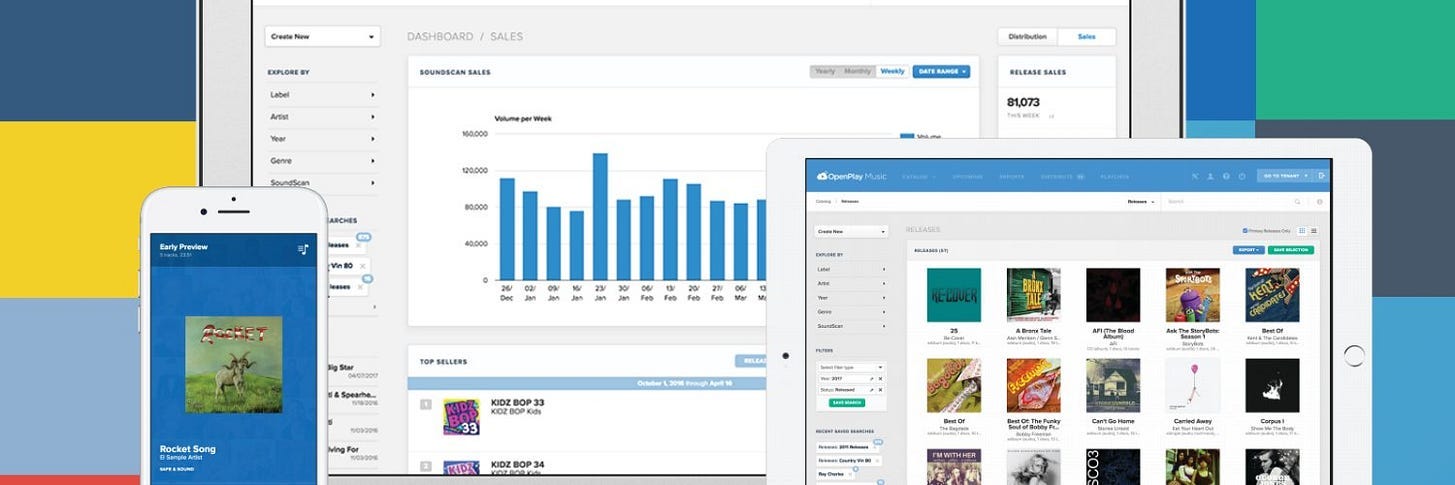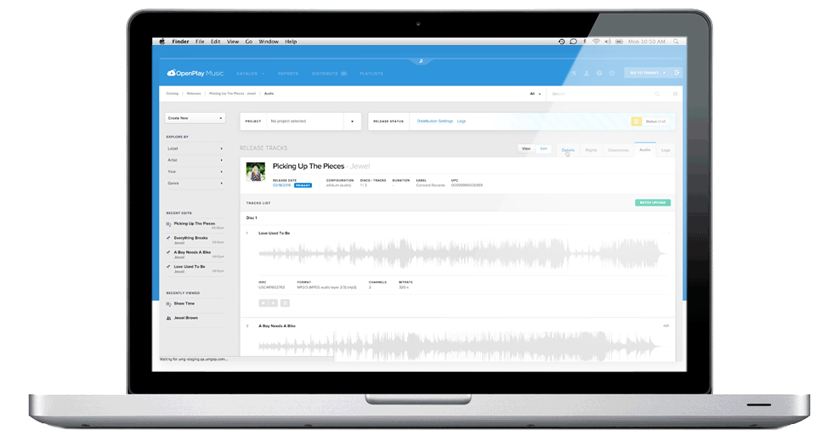A Popular Solution for Labels and Distributors, OpenPlay Continues to Boost Platform with New Features, Partnerships
OpenPlay bridges the gap between content creation, metadata management, assets, and delivery.
A leading asset management platform, trusted by major labels and independents alike to manage their catalogs, OpenPlay bridges the gap between content creation, metadata management, assets, and delivery.
Designed and built from the ground up by music industry experts, OpenPlay services customers that manage the largest libraries of valuable media assets in the world.
OpenPlay’s coupling of an intuitive interface with an extremely powerful enterprise toolset places it in a class above its competitors. With offerings for multiple different industry verticals, their entire suite of applications has solutions for every company no matter their size.
We had the pleasure recently to connect with Edward Ginis, Co-Founder and Chief Client Officer, at OpenPlay, to discuss latest developments, as well as dive into topics like asset management, the business of music streaming and upcoming projects.
P&S: What was the jumping-off point to start OpenPlay and get involved with the asset management side of the music industry?
Edward Ginis: OpenPlay is a product of the music industry and music professionals. It grew out of a need identified at Concord Music Group, as it began its now-legendary transition from a small-ish jazz label to the global player it is today. As Concord began to grow, the company realized there wasn’t an effective catalog management system in the market, the majors were building their own and the indies were using spreadsheets.
So Concord began building an internal content and rights management system, using the best in current technologies that were maturing — natively cloud and open-source.
Concord’s needs were not unique, so in 2013, Concord’s CTO, Edward Ginis led a technology team to spin off this CMS into the fully-independent OpenPlay platform that exists today. Today, OpenPlay continues to focus on best in breed technology solutions for the recorded music and publishing industry, allowing our customers to focus on what matters most — the music, the artists, and the fans.
P&S: You recently unveiled a new Developer Network — with DataArt as the lead partner. What’s the latest with this new project?
Edward Ginis: This partnership is intended to maximize the value of OpenPlay’s API. There are so many potential applications to leverage the OpenPlay CMS that we’ve been approached about, that candidly we can’t undertake them all. So we partnered with DataArt, who is digging in and thoroughly learning our APIs, so they can offer API-based applications for third parties to connect with OpenPlay.
While there are hundreds of development partners to choose from, we landed on DataArt as our first launch partner due to consistent examples of exemplary work in our space for some of the largest players.
Our continued investment into our API infrastructure will ensure that as we scale and our customers further embrace our solutions, they always have connectedness to the rest of their business and operational needs. This industry has a long history of doing iconic deals that are an operational nightmare to execute. Our job is to eliminate that nightmare and encourage our customers to be as prolific in both dealmaking and the tools they choose to use connected to their latest catalog.
Though our APIs are not just available to DataArt. In addition to DataArt, we’re working with partners such as Veva Sound to leverage the same advantages and these same APIs are available from day one to any of our customers.
P&S: How do you see the business of asset and catalog management; evolving over the next 5–10 years?
Edward Ginis: A robust CMS is critical to growth in the industry, and the still-poor quality of data exchange mechanisms continues to be a hindrance to effective commerce. The industry still has a hodge-podge of home-grown systems that, apologies to DDEX’ continued efforts, do not readily exchange data. It’s just not good enough. There’s a whole technical mini-infrastructure around maintaining messaging! A waste.
OpenPlay believes in what we call the “democratization of data” — data and assets should be easily exchangeable in support of commerce.
Unfortunately, the problem is the incompatible home-grown systems that distributors built, and which pretty much control the industry. Labels must use the proprietary CMS of their distributor, and changing distributors means changing CMS.
For those of you who have been through that process, it’s terribly time-consuming, and the distributor you’re leaving has no incentive to be helpful. In fact, it’s in their interest to make it hard, to erect “barriers to exit”. OpenPlay is on a mission to break those down.
One of the most impactful areas in catalog management today is oriented around rights . Deals are getting more complicated as there are many new forms of exploitation and the days of a simple “Worldwide” release are getting rarer. One of the areas OpenPlay has invested heavily in is simplifying the configuration and management of these rights, while still accommodating for the most complex amongst them.
Data should never be a hindrance, and it certainly shouldn’t be a competitive advantage, although many companies have built businesses on fixing data. OpenPlay is creating a baseline of foundational data, controlled by content owners as opposed to their distributors, which they can direct wherever their data and assets need to go, from a dropdown menu.
While what we have today is focused on music, these challenges exist in many other rights and asset based industries. Our unique architecture of OpenPlay was developed from day one to eventually step into television, film, video games, podcasts, and books.
P&S: It seems like the music industry will continue to seek out innovation/innovators to help manage the important cross-section of content, data, asset management and delivery. It’s easy to see the big
value in the proper organization of people, process and assets.
Edward Ginis: OpenPlay is built to be used by everyone in a music company, capturing data and assets from each department at each step along the way in content creation. It’s no longer just the “production department system”. OpenPlay displaces so many ancillary applications that have been built up in the absence of a single store of assets and data which benefit the whole company.
It’s the single source of truth for a record company. This is the real innovation of OpenPlay.
P&S: What are your thoughts on the overall business of ‘music streaming?’
Edward Ginis: It’s always been the ultimate configuration, and will only grow. Phones and bandwidth. But because the per stream rates are so small and fractional (unfortunately), it’s critical that the infrastructure be as efficient as possible. Democratization of data, right?
Leaning on the strength of our API infrastructure, we encourage new entrants into the market to consider building platforms that directly interface with label content with less friction — pushing the boundaries that DDEX is nowhere near solving while eliminating the immense learning curve for getting into our space.
We need more startups and risk takers helping find new revenue opportunities and that will only happen if we make the industry more welcoming to those technologists.
P&S: What’s next for OpenPlay? Any short-term or long-term projects to mention?
Edward Ginis: OpenPlay has two core products — OpenPlay for Labels and OpenPlay for Distributors. These remain the heart of the company, and we have many great label and distributor clients.
We recently initiated a service to deliver directly to music services (DSPs) — Direct Delivery — at the request of a group of both — fulfilling the “last mile” of delivery.
For labels and distributors that have their own licenses with DSPs (or use Merlin’s license), this has been a great benefit — OpenPlay creates the fully validated ERNs that the services need, so labels & distributors can deliver from directly within OpenPlay. It’s a big time and money saver.
In the near term, we’re also rolling out our financial analytics platform “InTune” to go along with the Direct Delivery service. Slice and dice and analyze your statements to anyone’s hearts content!
Longer term, we will continue to invest in new marketing tools to help those using OpenPlay to promote their releases and leaning deeper into the world of publishing (watch this space!).






